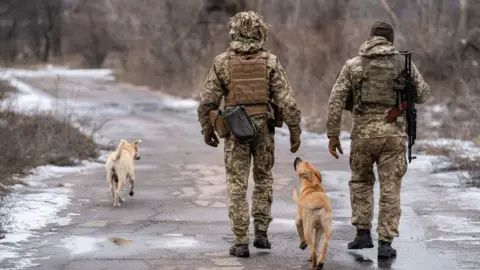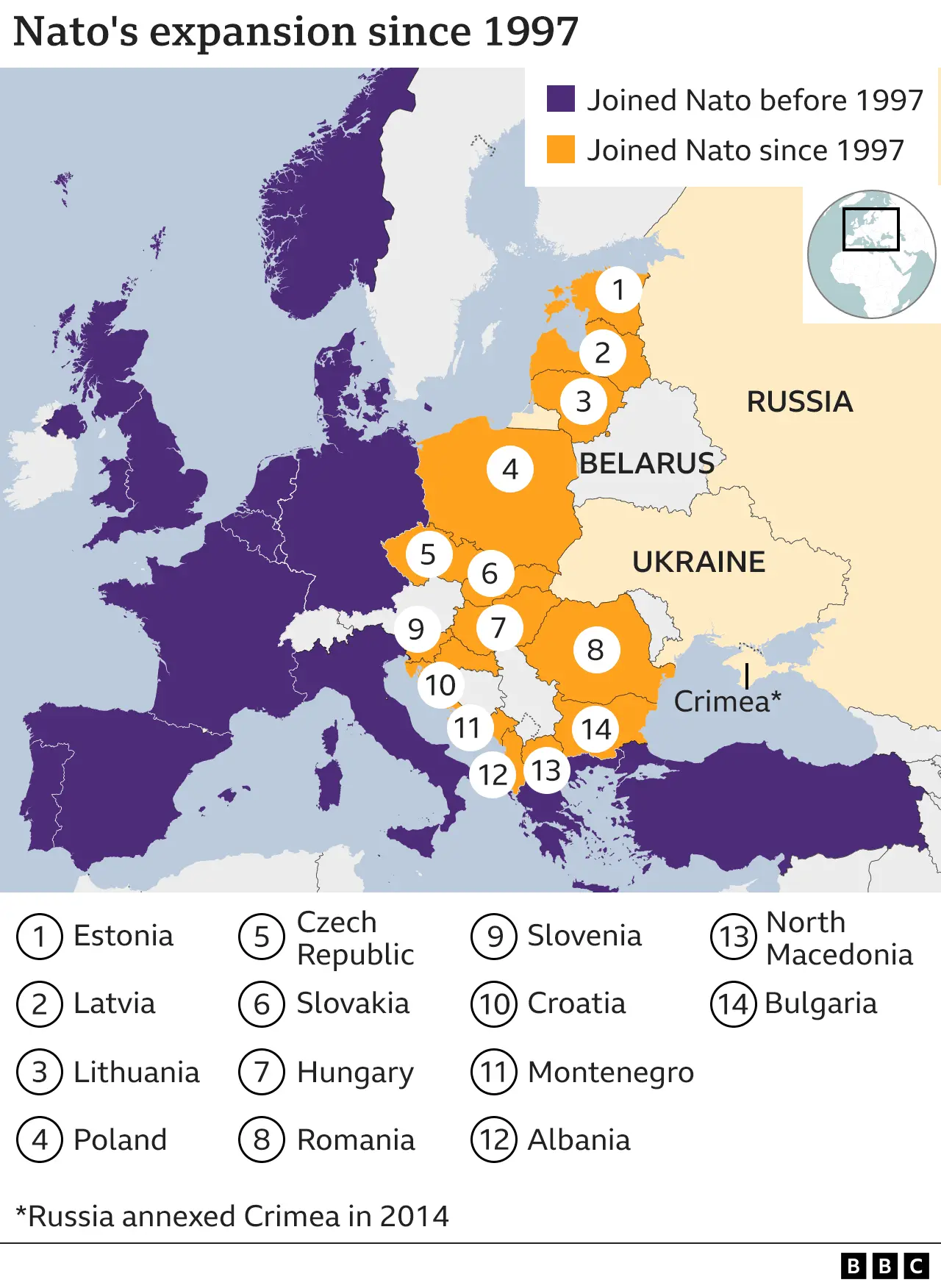UK must do more to support Ukraine - Commons Defence Chair
 Getty Images
Getty ImagesThe UK must do more to support Ukraine as "combat-ready" Russian troops gather on its borders, the chair of the Commons Defence Select Committee says.
Tobias Ellwood said Russian President Vladimir Putin was "taking full advantage of a weakened West".
"We are looking risk-adverse and somewhat timid... I suspect an invasion is now imminent," he told the BBC.
He warned that Mr Putin was "redrawing the map of eastern Europe" adding "it's so important that we step forward".
Western and Ukrainian intelligence services have suggested an invasion or incursion could happen some time in early 2022, after Russian forces amassed on the border.
Russia has denied it is planning an invasion, but Mr Putin issued demands to the West which he says concern Russia's security, including that Ukraine be stopped from joining Nato.
He also wants Nato to abandon military exercises and stop sending weapons to eastern Europe, seeing this as a direct threat to Russia's security.
Mr Ellwood said he was "really pleased" that the UK had recently agreed to supply Ukraine with defensive weapons and extra troops for training, albeit "late in the day" - and that France and Spain were following Britain's example.
But he said the US "was looking a little bit timid", suggesting that the US administration was caught up with domestic issues, with foreign policy focused on Taiwan and China.
"Politicians and leaders need to make the case [for Ukraine's defence]," said Mr Ellwood. "From where I sit the world is getting more dangerous, not less.
"We need to explain it to the British people, we need to explain it to the American people, the consequences... of allowing Russia to advance and change the borders in eastern Europe.
"There are ripple effects, that affect international security and, by extension, prosperity as well."
His views were backed by Labour leader Keir Starmer who tweeted on Saturday: "To protect our values and our security we must be steadfast in our opposition to Russian aggression. We must stand with our Ukrainian allies."
Hours after Russia's foreign minister and his US counterpart held what they called "frank" talks to try to reduce the chance of a wider conflict in Ukraine, a US shipment of "lethal aid" arrived in Ukraine's capital, Kyiv on Saturday.
The delivery, including ammunition for "front line defenders", marked the first part of a $200m (£147.5m) security support package approved by US President Joe Biden in December.
In a post on Facebook, US embassy in Kyiv said the shipment demonstrated its "firm commitment to Ukraine's sovereign right to self-defense".

Tensions over Ukraine
- EXPLAINED: Is Russia preparing to invade Ukraine?
- FROM KYIV: Ukrainians wait as Russia faces off with the West
- FROM BRUSSELS: EU 'closest to war' in decades over Russia-Ukraine crisis
- UK SUPPORT: UK says it is sending weapons to defend Ukraine
- What do you want to know about the tensions between Russia and Ukraine? Email [email protected]

On Friday, Downing Street said the Russian government will be "punished" if it "crosses the line" on Ukraine.
The PM's deputy official spokesman said "any destabilising action" by Russia would be a strategic mistake with significant consequences.
Mr Ellwood said it was important to look at "the wider picture" as far as Mr Putin's approach was concerned: "He wants a legacy, he wants to be seen as the most powerful state in Europe."
He suggested the Russian president had "boxed himself into a corner" with some 100,000 Russian troops currently amassed on the border "but he also recognises that he will never again be as strong as this."
"This is more than just about Ukraine, this is about Putin wanting to establish, absolutely, a sphere of influence way beyond Ukraine itself."
"He certainly doesn't want the EU or Nato rubbing up against the Russian Empire; he needs that buffer zone."
"Nato needs to develop a fresh sense of purpose," he cautioned.
Nato's 30 members - including the UK, US and several former Soviet Union states which share a border with Russia - agree that an armed attack against one is an attack against them all, and they will come to the aid of one another.
Dozens of British troops have been in Ukraine since 2015 to help train their armed forces, and the UK has also made a commitment to help rebuild Ukraine's navy following Russia's invasion of Crimea in 2014.
"The only way forward is for Russia to deescalate and engage in meaningful discussions," a Downing Street spokesman said on Friday.
Speaking from trade talks in Sydney, Foreign Secretary Liz Truss said Mr Putin must "desist and step back from Ukraine before he makes a massive strategic mistake", she said.

What does Putin want?
Russia's president has long claimed that the US broke a guarantee it made in 1990 that Nato would not expand further east. "They simply deceived us!" he said at a news conference last month.
Interpretations differ over what exactly was promised to the then-Soviet leader, Mikhail Gorbachev. But it is clear that Mr Putin believes the guarantee was made.
Since then, several central and eastern European countries, which used to be part of the Soviet Union or its sphere of influence, have joined Nato. Four of them - Poland, Lithuania, Latvia and Estonia - have borders with Russia.
Russia argues that this expansion, and the presence of Nato troops and military equipment near its borders, is a direct threat to its security.
The country seized and annexed the Crimean peninsula in southern Ukraine in 2014 after Ukrainians overthrew their pro-Russian president. Ever since, Ukraine's military has been locked in a war with Russian-backed rebels in areas of the east near Russia's borders.
There are fears that the conflict, which has claimed 14,000 lives and caused at least two million people to flee their homes, may reignite and that Russia's military will cross the border.



